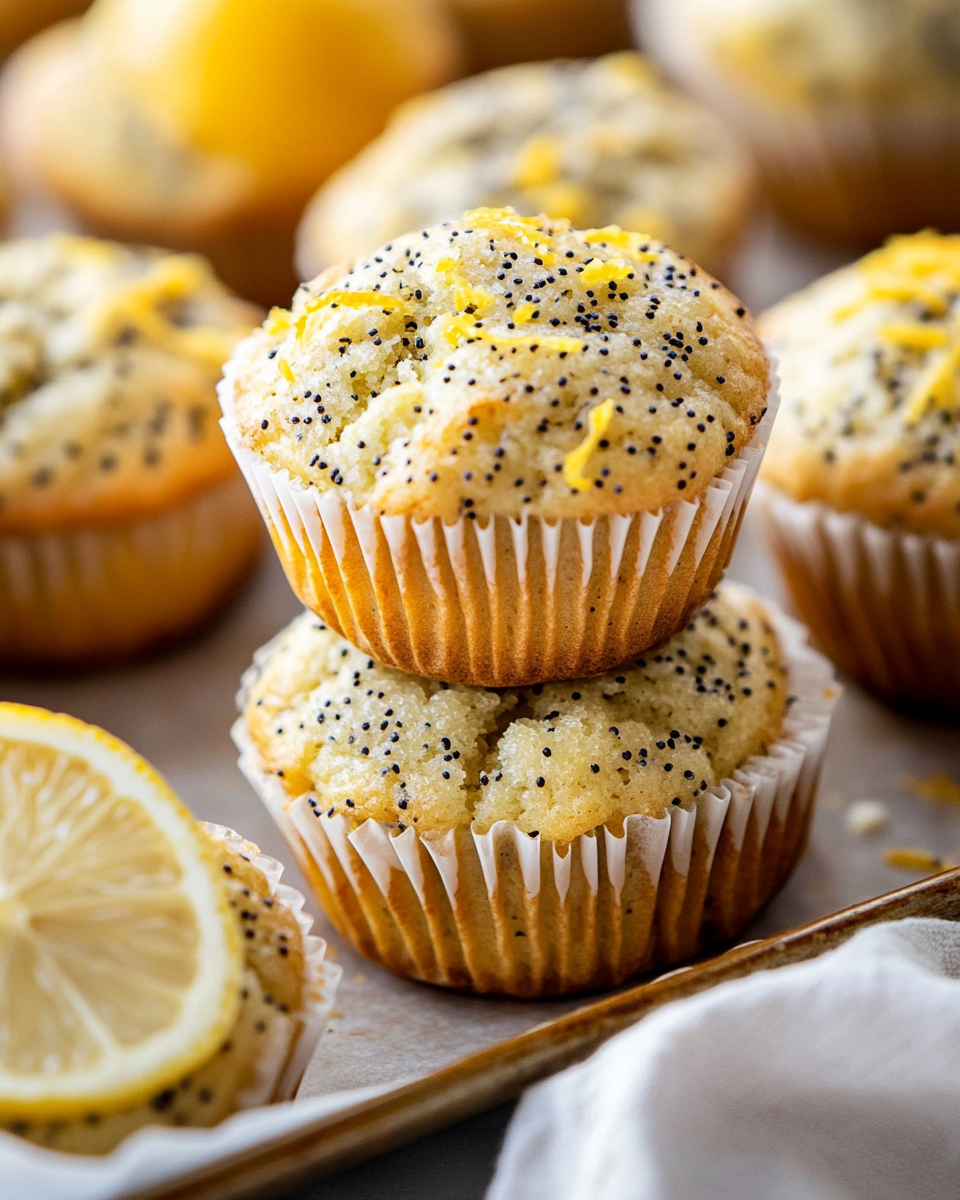A bright and zesty muffin perfect for breakfast or brunch, these Lemon Poppy Morning Muffins are bursting with citrus flavor and a delightful crunch from poppy seeds. They’re moist, fluffy, and just the right amount of sweet to start your day right.
FULL RECIPE
Ingredients
- 2 cups all-purpose flour
- 2/3 cup granulated sugar
- 1 tablespoon baking powder
- 1/4 teaspoon baking soda
- 1/4 teaspoon salt
- 2 tablespoons poppy seeds
- 2 large eggs
- 1 cup sour cream
- 1/2 cup unsalted butter, melted and cooled
- 2 tablespoons lemon zest (from about 2 lemons)
- 1/4 cup fresh lemon juice
- 1 teaspoon vanilla extract
Directions
- Preheat your oven to 375°F (190°C). Line a 12-cup muffin tin with paper liners or lightly grease it.
- In a large bowl, whisk together the flour, sugar, baking powder, baking soda, salt, and poppy seeds.
- In another bowl, whisk the eggs, sour cream, melted butter, lemon zest, lemon juice, and vanilla until smooth.
- Pour the wet ingredients into the dry ingredients and stir gently until just combined. Do not overmix.
- Divide the batter evenly among the prepared muffin cups.
- Bake for 18–22 minutes, or until a toothpick inserted into the center comes out clean.
- Let muffins cool in the tin for 5 minutes before transferring to a wire rack to cool completely.
Nutritional Information
- Calories: 255
- Total Fat: 14g
- Saturated Fat: 8g
- Cholesterol: 60mg
- Sodium: 200mg
- Total Carbohydrates: 29g
- Dietary Fiber: 1g
- Sugars: 13g
- Protein: 4g
- Vitamin D: 0.6mcg
- Calcium: 70mg
- Iron: 1.3mg
- Potassium: 100mg
History and Origin of Lemon Poppy Seed Muffins
Lemon poppy seed muffins have a rich culinary background rooted in European baking traditions. The use of poppy seeds dates back thousands of years, prized for their nutty flavor and crunchy texture. Combining them with lemon, a fruit symbolizing freshness and zest, creates a muffin that balances tanginess with a subtle crunch. Over time, this pairing became popular in American and British baking cultures, especially as a breakfast staple and tea-time treat. Its bright, cheerful flavor profile makes it a favorite for spring and summer menus.
Nutritional Benefits of Lemon and Poppy Seeds
Lemon is an excellent source of vitamin C, an antioxidant that supports immune health and skin vitality. Poppy seeds, though small, pack a nutritional punch with good amounts of dietary fiber, calcium, iron, and healthy fats. Together, they provide a balance of nutrients that can contribute to digestion and bone health. However, because muffins can include sugar and fats, it’s important to enjoy them in moderation as part of a balanced diet.
Why Sour Cream is Used in the Recipe
Sour cream adds moisture and tenderness to the muffin batter, giving the final product a rich and soft crumb. It also reacts with the baking soda and powder to help the muffins rise properly. The slight tang of sour cream complements the lemon’s acidity, enhancing the overall flavor. Many bakers prefer sour cream in muffins because it produces a moist texture that lasts longer than recipes relying solely on milk or yogurt.
The Role of Poppy Seeds in Baking
Poppy seeds are more than just a crunchy add-in; they contribute a subtle nutty flavor that contrasts nicely with sweet or citrusy ingredients. When baked, the seeds release oils that enrich the muffin’s texture. Additionally, poppy seeds provide an aesthetic appeal, giving the muffins a speckled, appealing look. They are often used in pastries, breads, and cakes worldwide for both their flavor and texture benefits.
Lemon Zest vs. Lemon Juice: Their Importance in Flavor
Both lemon zest and lemon juice are essential in this recipe but serve different purposes. Lemon zest contains the fruit’s aromatic oils and imparts a bright, intense lemon flavor without additional liquid. Lemon juice adds acidity and moisture, balancing the sweetness and helping to activate the leavening agents in the batter. Using both ensures a full lemon flavor that is both fragrant and tangy.
Tips for Perfect Muffin Texture
Achieving a tender yet fluffy muffin requires careful mixing. Overmixing can develop gluten in the flour, leading to dense, tough muffins. The key is to combine wet and dry ingredients just until they come together. Another tip is to use room temperature ingredients for even mixing and better rise. Baking at the right temperature ensures the muffins cook through without drying out or becoming too browned.
Variations and Flavor Enhancements
This muffin recipe is versatile and can be adjusted for different tastes. Adding a lemon glaze or a simple powdered sugar dusting can enhance sweetness and presentation. Some variations include incorporating blueberries, almond extract, or a crunchy streusel topping. For a healthier twist, whole wheat flour or alternative sweeteners can be used, though these adjustments may slightly change the texture and flavor.
Storage and Shelf Life
Lemon poppy seed muffins keep best when stored in an airtight container at room temperature, lasting about 2-3 days. For longer storage, they can be frozen for up to 3 months. To freeze, wrap each muffin individually in plastic wrap and place them in a freezer-safe bag. Thaw muffins overnight in the refrigerator or warm them gently in a microwave before serving to restore freshness.
Pairing Ideas for Serving
These muffins pair beautifully with a variety of breakfast or brunch beverages like coffee, tea, or fresh fruit juices. They also complement creamy spreads such as butter, cream cheese, or lemon curd. For a more substantial meal, serve them alongside yogurt and fresh berries. Their light, citrusy flavor also makes them a refreshing snack on their own or with a cup of herbal tea.
Healthier Alternatives and Modifications
To make these muffins healthier, you can substitute some or all of the all-purpose flour with whole wheat flour or oat flour, which adds fiber and nutrients. Reducing sugar or replacing it with natural sweeteners like honey or maple syrup can lower the glycemic impact. For dairy-free versions, replace sour cream with coconut yogurt or a plant-based sour cream alternative. These modifications allow you to enjoy the muffins while tailoring them to dietary preferences.
Common Mistakes and How to Avoid Them
A common mistake in muffin baking is overmixing, which leads to tough, dense muffins. Another is incorrect oven temperature—too high can burn the exterior before the inside is cooked; too low results in flat, undercooked muffins. Using expired baking powder or soda can also cause poor rise. Always measure ingredients carefully and follow baking times to avoid these pitfalls.
Cultural Significance and Popularity
Lemon poppy seed muffins have gained popularity worldwide due to their bright flavor and pleasant texture. They are commonly featured in bakeries, cafes, and home kitchens, particularly in Western countries. Their appeal lies in their balance of sweetness and tartness, making them an ideal comfort food that also feels fresh and sophisticated. They often appear on menus for special occasions like brunches, showers, and holidays.
Conclusion
Lemon poppy seed muffins are a delightful blend of bright citrus and crunchy seeds, offering a balance of flavor and texture that appeals to many. Their rich history, nutritional benefits, and versatility in baking make them a beloved recipe for breakfast and beyond. Whether enjoyed plain or with creative twists, they are simple to make and satisfy a craving for something sweet and tangy. With tips for perfect texture and storage, anyone can confidently bake these muffins and enjoy their fresh, vibrant taste anytime.






